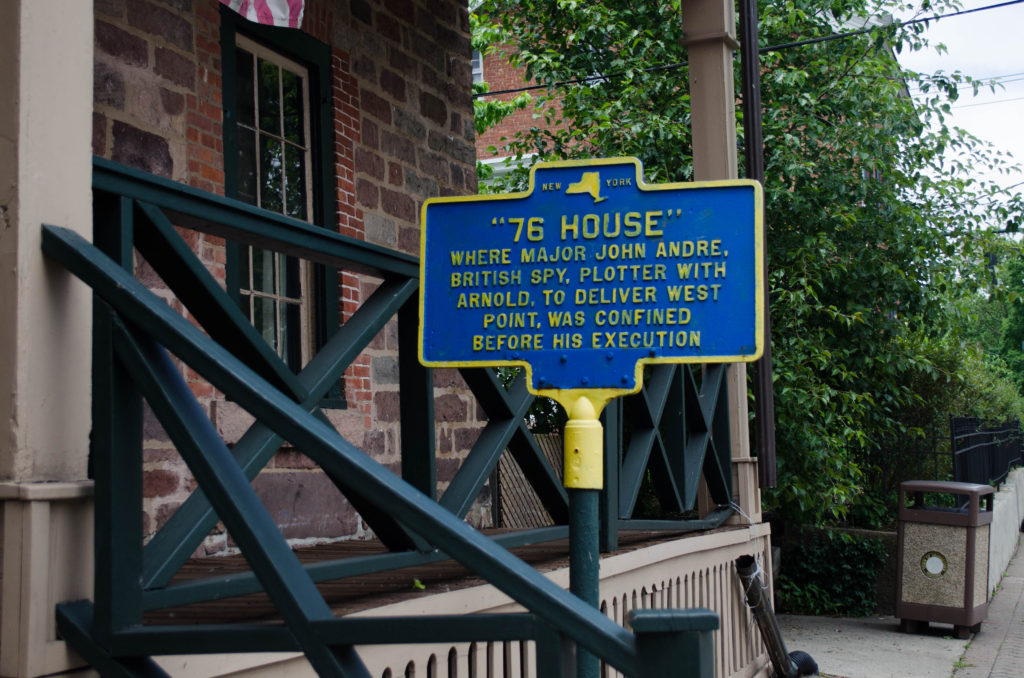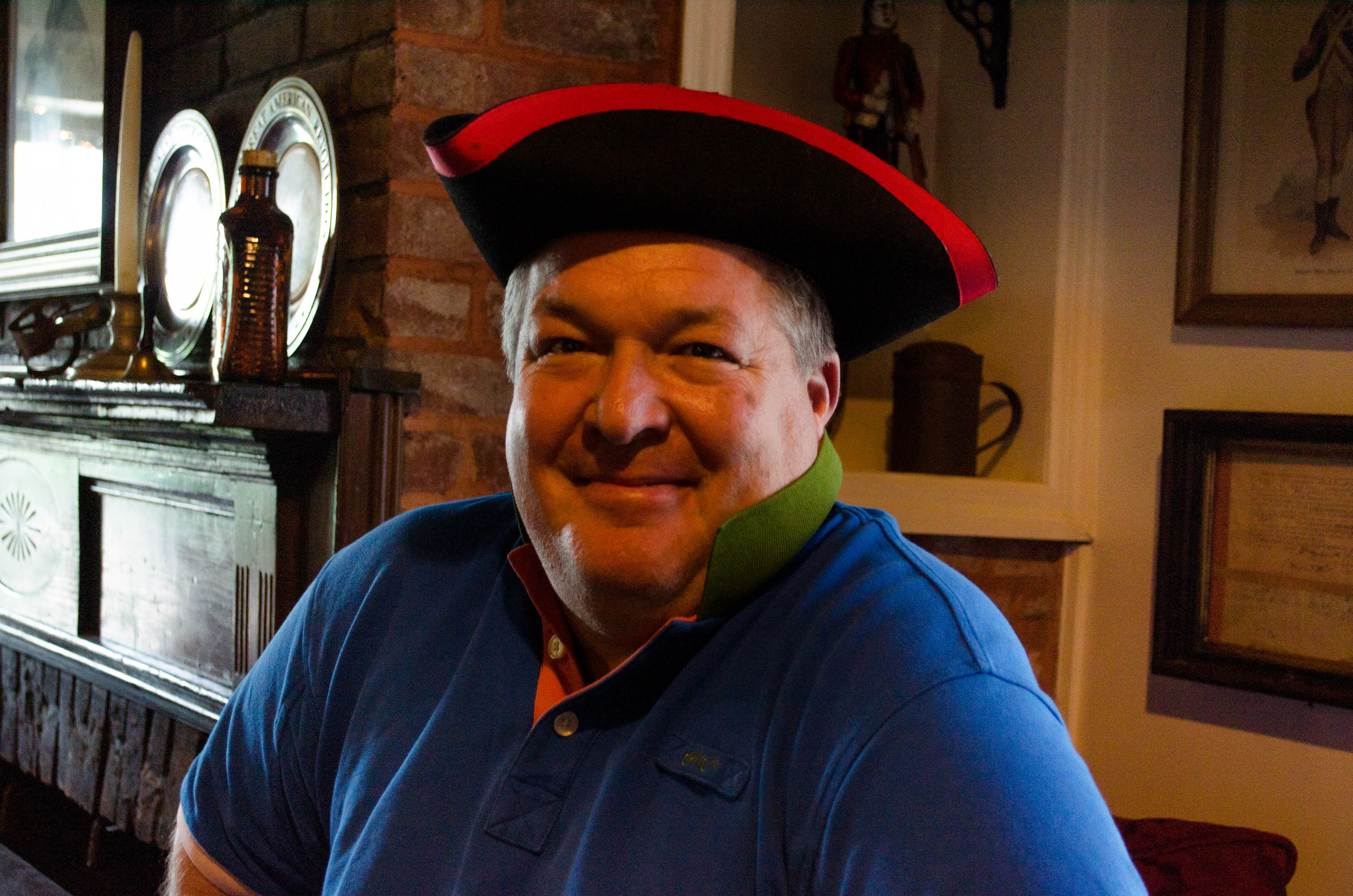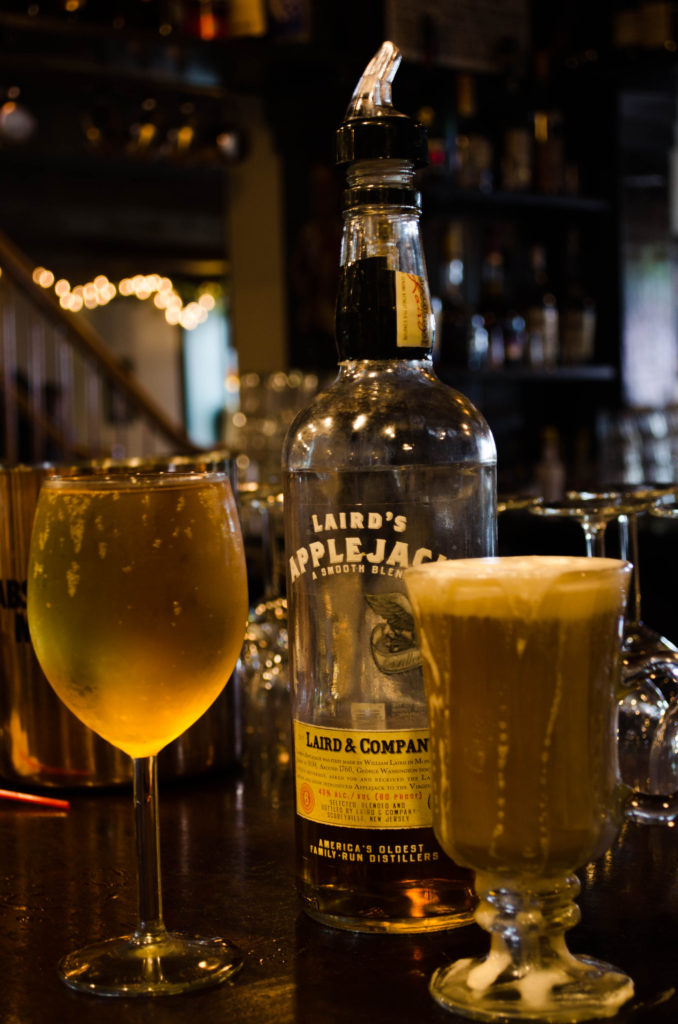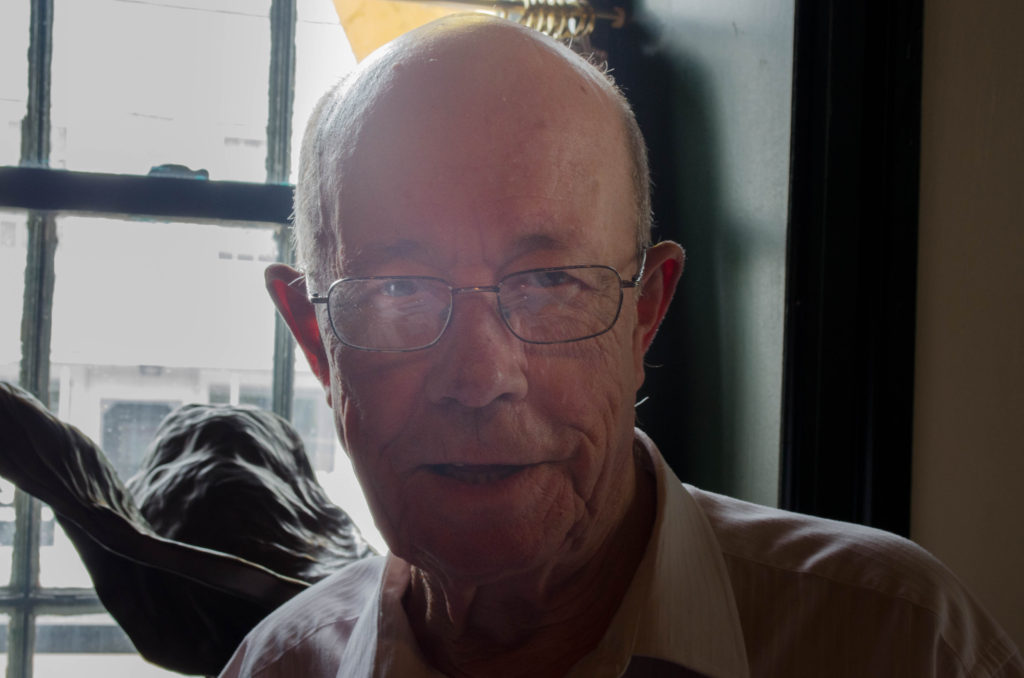The sign made me stop the car. I almost missed it as we drove through the slim, two-laned Main Street dotted with the red-brick and gray and beige two and three-story homes of Tappan, New York—an encampment for the Continental Army and a front line in the American Revolution. This town of about 6,000 once stood between British strongholds in Fort Lee, New Jersey, New York City and the patriot stronghold at West Point. Today, among the tall, big, boxy homes sits a short, small stone building with two chimneys, a generous porch, a hitching post, and several flags hang from the ceiling. The bright blue historical marker out front reads: “Where Major John André, British spy, plotter with Arnold, to deliver West Point, was confined before his execution.” I smelled a mystery and knew my destination stood in front of me—the ‘76 House.

“Re-enactors like to come here because this is where it all happened,” says tavern keeper Rob Norden, 51, who welcomed me and my two companions into the ’76 House with a large smile. Dressed in a green t-shirt and beige cargo pants, Norden explains that he carried out the restoration and preservation work on the property 31 years ago. “Places like Colonial Williamsburg are like Disneyland. It is the unexpected, quiet places like the ’76 House where one finds the echo of an era gone by. To real history buffs, it is a surreal experience to drink and eat in the same room as the Founding Fathers, separated from them only by a gap of a little bit over two centuries.”

Known as “the oldest bar in New York,” the ‘76 House served as headquarters for General Nathanael Greene, and as a makeshift prison for André before his trial, which was held in the Tappan Reformed Church (he was hung for his treason on what is today known as André Hill). It is one of the many places where the Founding Fathers sat and discussed the tactics, strategies, and ideas that came to define the American Revolution. The tavern’s more recent historical moments include it appearing in several scenes from the first season of The Sopranos, and in the movie Stepmom, starring Susan Sarandon and Julia Roberts.
At first glance, it looks like any other drinking establishment. Wooden chairs sit around the back room’s round tables, and the front room—the actual site of many of Washington’s meetings— features comfortable sofas and cushioned chairs. Once known as Mabie’s Inn (named after owner Yoast Mabie, whose home, which served as the location for the signing of the Orangetown Resolutions, sat around the corner), the ‘76 today is a place where the past whispers in the ears of its patrons. Some of the décor suggests the history that makes it a must-see visit for any history buff. Mannequins, dressed in uniforms like those worn by colonial soldiers, stand at attention just inside the door and welcome guests to the bar. Muskets of varying lengths hang on the wall in a silent tribute to the battles of the Revolution. Paintings of Alexander Hamilton, George Washington, and scenes from the various battles populate the walls.
As I sit in the dining room with my friends, I imagine the conversations that Washington might have had with his comrades. Did he eat the same French onion soup that I was eating now? Did his Laird’s Applejack taste as rich as the one in my glass? Was he as fond of Crème Brulee as my traveling companion, Tanya? Or were they all too stressed to really taste the tavern’s offerings? And, while I’m at it: Why does the menu feature an item titled Alligator Empanadas?

As I’m contemplating why an aquatic reptile associated with Southern states resides on the menu of a historical bar in New Jersey, a British voice from a few tables away offers an entrée recommendation. “The fish and chips here are absolutely marvelous,” the fellow diner says. I turned around to see a 60-something, balding man with bluish eyes dining with a young girl and a man. His praise surprised me. For my friends and I, the dishes seemed profoundly ordinary (with the exception of the alligator). “I can get a similar burger at Five Guys for half the price,” my friend commented as she scanned the menu.
But our fellow diner praises the food with words such as “delectable” and “marvelous.” One explanation for his compliments may be the origin of his palate. For A. R. Homer, an English author who grew up on the simple fare of his homeland, the Old ’76 Tavern’s offerings must remind him of home.
“But that isn’t why I come here every year,” he says placing his cutlery perfectly in the 20-past-four position. “I come here for the history of the place. Revolutions and wars fascinate me, but not for their blood and gore. I like the small nuggets and anecdotes. I believe this building is full of them.”
I opened my mouth to ask him a follow-up question, but he answered me before I spoke a word. “However, the food is exceptional here, and I would not return year after year for 10 years were that not the case,” he says. “And yes, fish and chips are my very favorite. And Mr. Norden’s recipe is on point.”

By the time we finish our meal, the tavern is quiet and we are the only patrons. It’s close to closing time and only the sweet harmonies of a Michael Giacchino melody fill the room. Pianist Rick Oelkers plays on as if in a trance. Eyes closed, his fingers brush the black-and-ivory keys as the music punctuates the silence of this uneventful night.
As Oelkers finishes the last song and shuts the lid of the piano, Norden’s staff begins pushing chairs under tables and locking doors. With Washington’s bravado flowing through my veins (thank you, Applejack) and history illuminating through my thoughts, I struggle with calling it a night. We load back into the car, pull away from the tavern, and head off into the dark.
Cover photo credit: Ankur Dang.